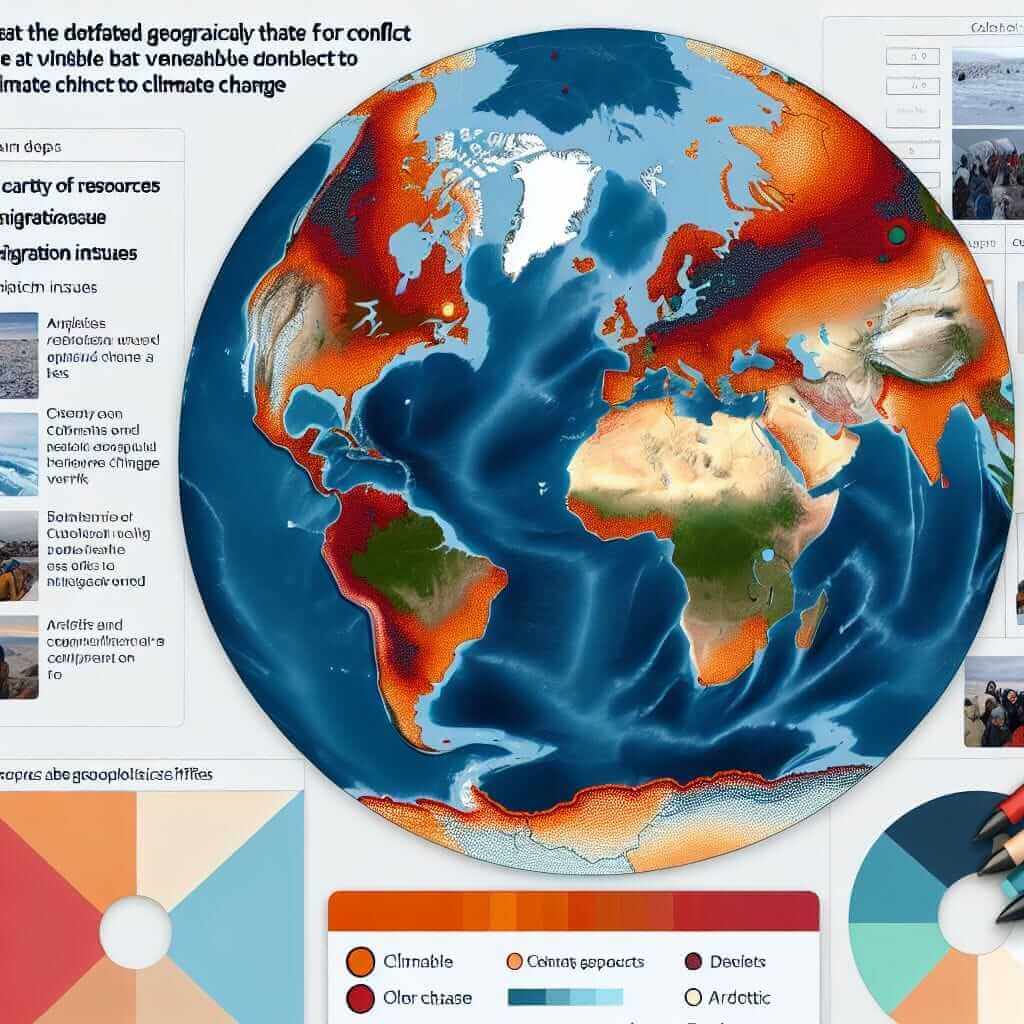The IELTS Reading Test is a fundamental component of the IELTS exam designed to assess reading comprehension skills. A recurring theme in this test is climate change and its broad implications, including its influence on international conflict. Understanding such topics can not only help in the actual exam but also in developing a deep comprehension of global issues. Given the rising significance of climate change, it is prudent to explore the historical and potential future appearance of such themes in the IELTS exam.
Reading Passage on Climate Change and International Conflict
To aid your preparation, below is a reading passage followed by a set of questions, formulated to mimic the IELTS Reading Test. This topic is categorized under “Medium Text” complexity.
Reading Passage:
Climate change, a ubiquitous global issue, affects not only the environment but also international stability. Rising temperatures, sea-level changes, and extreme weather events intensify resource scarcity, particularly water and arable land. This strain can exacerbate tensions among nations, potentially leading to conflicts.
Resource Scarcity and Conflict
As resources become scarcer, nations may compete fiercely for what remains. Regions already suffering from pre-existing tensions could see these magnified as livelihoods become untenable, migration increases, and economies falter. The Horn of Africa, for instance, has experienced significant conflict partially due to the adverse effects of climate on agriculture.
Migration and Security
Climate-induced migration is another critical factor. People displaced by rising sea levels or unbearable heat often seek refuge in more stable regions. This influx can burden the host countries, leading to stiffer immigration policies and strained international relations. The Syrian refugee crisis offers a lens through which to view climate migration, where prolonged drought contributed to civil unrest and a subsequent humanitarian crisis.
Geopolitical Tensions
Geopolitical dynamics can dramatically shift as countries renegotiate boundaries and control over new, valuable territories—such as the Arctic, which is becoming more accessible due to melting ice caps. Strategic interests in these areas can lead to new alliances and conflicts, influencing global security on a grand scale.
Questions and Tasks
Multiple Choice
-
What is a direct consequence of climate change on resources?
- A. Increase in wildlife diversity
- B. Increased resource scarcity
- C. Enhanced global cooperation
- D. Reduction in industrial activities
-
Which of the following regions is highlighted as an example of climate-induced conflict?
- A. Southern Europe
- B. Horn of Africa
- C. North America
- D. Central Asia
Identifying Information (True/False/Not Given)
- Climate change solely leads to positive outcomes on migration. (True/False/Not Given)
- The melting of Arctic ice caps has no impact on geopolitical relations. (True/False/Not Given)
Matching Headings
- Match the following headings with the correct paragraphs.
- i. Migration and Security
- ii. Resource Scarcity and Conflict
- iii. Geopolitical Tensions
Sentence Completion
- Climate change affects international stability by exacerbating ____ and increasing migration.
- The Arctic is becoming a point of interest due to ____ caused by climate change.
Answer Keys
- B
- Explanation: Climate change exacerbates resource scarcity; hence, B is correct.
- B
- Explanation: The Horn of Africa is explicitly mentioned as facing conflict due to climate change effects.
- False
- Explanation: Climate-induced migration can lead to strained international relations, a generally negative outcome.
- False
- Explanation: The melting of Arctic ice caps influences geopolitical dynamics, making the statement false.
-
- i. Paragraph 2
- ii. Paragraph 1
- iii. Paragraph 3
- tensions
- Explanation: Paragraph 1 mentions tensions as a result of scarcity.
- melting ice caps
- Explanation: Paragraph 3 discusses geopolitical interest because of melting ice caps.
Analysis and Common Pitfalls
Common Mistakes:
- Overlooking keywords in the passage that correspond directly to the questions.
- Misinterpreting True/False/Not Given by not distinguishing between given evidence and assumptions.
- Matching incorrect headings due to incomplete understanding of paragraph contents.
Vocabulary and Grammar
Key Vocabulary:
- Ubiquitous (adj): /juːˈbɪkwɪtəs/ Pervasive; present everywhere
- Arable (adj): /ˈærəbl/ Suitable for growing crops
- Migration (n): /maɪˈɡreɪʃn/ Movement from one region to another
- Geopolitical (adj): /ˌdʒiː.oʊ.pəˈlɪt.ɪ.kəl/ Pertaining to politics influenced by geographic factors
Key Grammar:
- Modal Verbs in Future Predictions: “Climate change can lead to severe resource scarcity.”
- Comparative Structures: “As resources become scarcer…”
- Complex Sentences with clauses: “Given that resources become scarce, nations may compete…”
Lời khuyên
- Practice Regularly: Dedicate time to practice reading passages similar to this example to familiarize yourself with the complexity and varying structures of questions.
- Focus on Keywords: Pay attention to significant terms within the passage and questions.
- Expand Vocabulary: Regularly learn new words and phrases that are common in academic texts.
- Timed Practice: Simulate exam conditions to improve your time management skills during the test.

By understanding and practicing with real-world issues like the implications of climate change on international conflict, you are well on your way to mastering the IELTS Reading section.